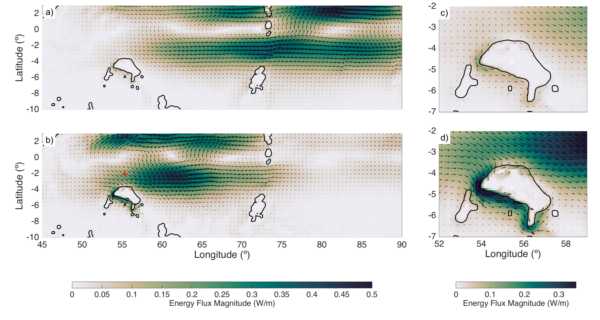Daily POP Model Output over the Equatorial Indian Ocean
About this collection
- Extent
-
1 digital object.
- Cite This Work
-
Arzeno-Soltero, Isabella B.; Giddings, Sarah N.; Pawlak, Geno; McClean, Julie L.; Wang, He; Rainville, Luc; Lee, Craig M. (2021). Daily POP Model Output over the Equatorial Indian Ocean. UC San Diego Library Digital Collections. https://doi.org/10.6075/J0XW4HCF
- Description
-
This collection includes a spatial subset (10ºS-3ºN, 45ºE-90ºE) of forced coupled ocean/sea ice simulations using CICE4 and the global Los Alamos National Laboratory Parallel Ocean Program Model 2 (POP), run in the Community Earth System Model (CESM) framework. The output includes daily temperature, density, velocity, and wind stress from 2005-2009, at 42 depth levels, with a vertical resolution that varies from 10 m at the surface to 250 m at depth, and a nominal horizontal resolution of 0.1º. For more information on the setup, processing, and analysis, please refer to Arzeno-Soltero et al. 2021 (DOI to be determined later).
- Creation Date
- 2005 to 2009
- Date Issued
- 2021
- Creator
- Author
- Advisors
- Contributors
- Funding
-
Support for the field study and for Arzeno-Soltero, Giddings and Pawlak was provided by the Office of Naval Research (ONR) under the NASCar DRI (Terri Paluszkiewicz and Scott Harper), awards N00014-15-1-2319 to Giddings and N00014-15-1-2303 to Pawlak. McClean and Wang were supported by ONR grant N00014-15-1-2189 to McClean. Julie McClean was also supported by U.S. Department of Energy (DOE) grants SC0012778 and SC0020073. Funding for the POP/CICE simulation was provided by a DOE BER grant entitled “Ultra High Resolution Global Climate Simulation” via a Los Alamos National Laboratory subcontract (to McClean); Caroline Papadopoulos (SIO/UCSD) and Elena Yuleava (UCSD) carried out the POP/CICE simulation. The POP simulation used Yellowstone (ark:/85065/d7wd3xhc) computational resources provided by the National Center for Atmospheric Research (NCAR)'s Climate Simulation Laboratory (CSL), sponsored by the National Science Foundation (NSF).
- Topics
Format
View formats within this collection
- Language
- English
- Identifier
-
Identifier: Geno Pawlak: https://orcid.org/0000-0003-3718-1880
Identifier: He Wang: http://orcid.org/0000-0002-9405-1452
Identifier: Isabella B. Arzeno-Soltero: https://orcid.org/0000-0002-2518-7233
Identifier: Julie L. McClean: https://orcid.org/0000-0002-8221-2714
Identifier: Sarah N. Giddings: https://orcid.org/0000-0003-0726-4781
- Related Resources
- Arzeno-Soltero, I. B., Giddings, S. N., Pawlak, G., McClean, J. L., Wang, H., Rainville, L., & Lee, C. M. (2021). Generation of low-latitude seamount-trapped waves: A case study of the Seychelles Plateau. Journal of Geophysical Research: Oceans, 126, e2021JC017234. https://doi.org/10.1029/2021JC017234
- Community Earth System Model at National Center for Atmospheric Research: https://www.cesm.ucar.edu/models/
- Hunke, E. C., Lipscomb, W. H., Turner, A. K., Jeffery, N., & Elliott, S. (2010). CICE: the Los Alamos Sea Ice Model Documentation and Software User’s Manual Version 4.1 LA-CC-06-012. T-3 Fluid Dynamics Group, Los Alamos National Laboratory, 675, 500. https://csdms.colorado.edu/w/images/CICE_documentation_and_software_user's_manual.pdf
- Hurrell, J. W., Holland, M. M., Gent, P. R., Ghan, S., Kay, J. E., Kushner, P. J., ... & Lipscomb, W. H. (2013). The community earth system model: a framework for collaborative research. Bulletin of the American Meteorological Society, 94(9), 1339-1360. https://doi.org/10.1175/BAMS-D-12-00121.1
- McClean, J., Bader, D. C., Maltrud, M. E., Evans, K. J., Taylor, M., Tang, Q., ... & Mahajan, S. (2018, February). High-resolution fully-coupled acme v0. 1 approximate present day transient climate simulations. In 2018 Ocean Sciences Meeting. AGU. https://agu.confex.com/agu/os18/meetingapp.cgi/Paper/315049
- Smith, R., Jones, P., Briegleb, B., Bryan, F., Danabasoglu, G., Dennis, J., ... & Hecht, M. (2010). The parallel ocean program (POP) reference manual: ocean component of the community climate system model (CCSM) and community earth system model (CESM). LAUR-01853, 141, 1-140. http://n2t.net/ark:/85065/d70g3j4h
Primary associated publication
Software
Reference
 Library Digital Collections
Library Digital Collections
